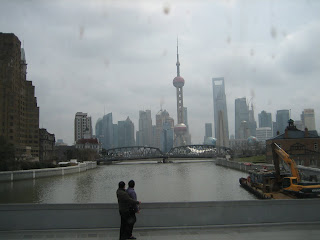





In the roughly 100 years subsequent to the first Opium War, Shanghai, not Hong Kong, was at the center of the British business enterprise in East Asia. The Opium Wars had resulted in foreign “footprints” within the city, in zones called concessions. These were essentially extra-territorial pieces of Great Britain or France, which were governed by the laws of these foreign nations. The construction of magnificent buildings, still evident(two photos), along the Huangpo River in downtown Shanghai(The Bund) testify to just how profitable these foreign enterprises had become. During these salad days, enterprising Jewish businessmen had erected a stately, neo-classical synagogue in the French concession(1 photo). But as the clouds of the Second World War gathered in the late 1930’s, the forces of destruction and disorder were about to bring down the curtain on this commercial party. To those who were willing to see, the Jews of central Europe were facing a catastrophe. But by 1938, few nations were willing to accept Jews seeking refuge from the Nazis. China, terribly weak and disorganized, and ravaged on its own soil by Japan, remained open to one last wave of foreigners. Those with enough resources to buy a ticket on the Lloyd Trentino Line could find passage from Genoa or Iraq to Hong Kong and Shanghai. This group came not to invest, but to save their lives: These were the refugees who formed the Ohel Moshe Synagogue(address number 62). The future U.S. Treasury Secretary Michael Blumenthal, lived at number 61. Most survived the war, and then dispersed to the West. (Also shown is a shot of modern Shanghai, taken while crossing Suzhou Creek.)
No comments:
Post a Comment